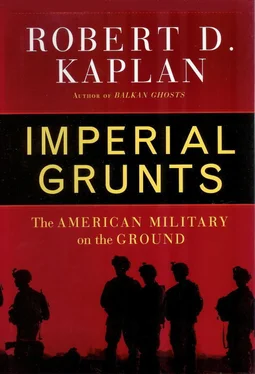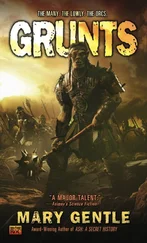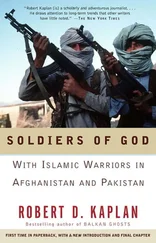Because of their own al-Qaeda problem, the Yemenis were suspicious of anyone with a Pakistani visa inside his passport. I was pulled over by a man smoking a cigarette and wearing a torn sweater and slippers. Adolph, seeing that I was making no progress, ambled over to him, speaking in bad but passable Arabic, gritting his teeth each time he made a point. Others were also haggling with customs and passport officers. It was a typical third world scene: confusion and a cacophony of negotiation in place of fixed standards.
After more of Adolph’s pleading, I got back my passport. We headed for the parking lot. It was 2 a.m. Two beggar boys grabbed my bags and put them in the Land Cruiser. Adolph slipped them half a dollar in riyals. I was relaxed. The Arab world, while afflicted by political violence, had little or no common crime. In this sense, Islam had risen to the challenge of urbanization and modern life, and was a full-fledged success.
“This is the most democratic state in Arabia. For that reason it’s the most dangerous and unstable,” Adolph said, explaining that when Western-style democracy replaced absolute dictatorship in places with high unemployment rates and weak, corrupt institutions, the result was often a security vacuum that groups like al-Qaeda could take advantage of. “I’ve drawn up multiple evacuation plans for the U.N. staff here, updating calling-tree lists,” he went on. “If the place goes down during the night, I can have all our people in Asmara the next day in time for brunch at the InterContinental there. The trick is to keep doing favors for people in the army, the police, and the tribes, and never call them in, until you need them to get your people out.”
He veered to avoid another head-on. “Notice the way people drive here, you’ve got ten-year-olds propped up on phone books driving Granddad around town. Forget about rules and licenses. Keep all of your cash in different pockets. Despite all of the guns, ready cash always gives you more power in Yemen than a gun. Everybody in this country is a businessman, and a good one.” His tone was commanding, didactic.
It was the last night of Ramadan. Though a few hours before dawn, the streets were noisy and crowded, and gaily strung with lights. Sana’a resembled a fairy-tale vision of Arabia, with basalt and mudbrick buildings festooned with colored glass fretwork and gypsum friezes. I recalled my first visit to Yemen in 1986.
Back then, the diplomats and other area specialists had assured me that with the discovery of oil in significant amounts, the Yemeni government would soon have the financial wherewithal to extend its power into the countryside, ending the feudal chaos. The opposite had occurred. To placate the sheikhs, the government bribed them with the newfound wealth, so oil revenues strengthened the medieval periphery rather than the modernizing capital. Kidnappings of foreign tourists erupted in the mid-1990s, as the sheikhs got greedy and sought to further blackmail the government. The government also had to compete with wealthy Wahabi extremists from Saudi Arabia and with al-Qaeda, who sometimes had more money with which to influence local Yemeni tribal leaders. With al-Qaeda targeting oil vessels off the Yemeni coast, maritime insurance rates had gone up, reducing sea traffic and consequently the amount of money from oil exports, so the regime had less money for bribes. The foreign community feared that a new wave of kidnappings might lie ahead.
For al-Qaeda, Yemen was a conveniently chaotic, culturally sympathetic country in the heart of Arabia, so much more desirable than far-afield, non-Arab Afghanistan. It might just be a matter of chipping away at the regime.
In downtown Sana’a, I noticed that people were not wearing the cheap Westernized polyesters that signify the breakdown of tribal identities under the pressure cooker of urbanization. They still wore white thobes with checkered keffiyahs or Kashmiri shawls, with the men sporting jambiyas (ornamental curved daggers) in the middle of their belts.
“It’s tribal everything,” another U.S. military source would explain to me. “The ministries are fiefdoms for the various tribes. It’s a world of stovepipe bureaucracies. All the information flows to the top and none of it is shared along the way, so that only [President Ali Abdullah] Saleh knows what is going on. As for the furious demands from the Americans to fight bin Laden, we Americans are just another crazy tribe that Saleh holds close to his chest, and balances against the others. Same with al-Qaeda. Saleh has to appease and do favors for everyone to stay in power.” Yeah, I thought, whichever dog is closest to biting him, he feeds.
Adolph told me that the Yemeni government controlled only about 50 percent of the country. A high-ranking Western diplomat in Yemen would hotly dispute that claim, telling me that Saleh controlled “all the main roads, oil fields, and pipelines,” which, I countered, was less than 50 percent of the country. “Well,” the diplomat huffed, “he controls what he needs to control.” If that was the case, I thought, then why was there such a problem with al-Qaeda in Yemen at the time of my visit? The difference between Adolph and this diplomat was not in their facts, or even in their perceptions, it would turn out. Rather, like the Marine lieutenant colonel I had met briefly at Camp Pendleton, Adolph didn’t know how to be subtle, or how to dissemble. He was brutally, refreshingly direct. Dealing with him saved time.
Inside the galloping Land Cruiser, Adolph knocked off the most recent security “incidents” in the country. His apartment building had been the scene of a gun battle between the son of a highly placed sheikh and government forces, with four people “KIA” (killed in action). Several more had been killed during a firefight between the al-Haima and Bani Mattar tribes outside Sana’a. Two bombs had exploded near the homes of government officials in the capital. In nearby Ma’rib there had been an attempt to assassinate the regional governor, Abdullah Ali al-Nassi, when tribesmen blocked the road and opened fire on his vehicle. The reasons for all this violence remained murky. As for al-Jawf and other areas on the Saudi frontier, there had been so many bombings and gun battles that Adolph hadn’t bothered to investigate or keep count. All this was a prelude to the assassination of a leading Yemeni politician and the murder of three American missionaries.
Adolph, trained as a hostage negotiator by Great Britain’s New Scotland Yard, told me what to do in case I was kidnapped: “Don’t protest. Be submissive. Show them pictures of your family to establish a relationship. After the first few hours, ask to see the sheikh. If they take you to meet him, it’s all right. It’s an authorized kidnapping, for the sake of convincing the authorities to give the tribe a new road or water well. They’ll tell you the negotiations should be completed in a few days; figure two months. Foreigners have been known to gain weight in the course of being held hostage in Yemen. Each family in the village will host you for a while, to divide the cost of your food. But if they don’t take you to see the sheikh the first day, start to worry. Then it may be an unauthorized kidnapping, and it’s okay to think of ways to escape.”
He slowed the vehicle as we got closer to his apartment in a wealthy area of Sana’a where many expatriates lived. High walls, armed guards, and concertina wire were everywhere: the paraphernalia of paranoia.
———
I was headed for Injun Country, Adolph told me. He meant the desert wastes of northern Yemen abutting the Saudi border, a border that the Yemeni government was attempting to demarcate, even as local tribesmen were blowing up the new border markers. The next day I had an appointment with a sheikh who could provide me with guards and a guide, a sheikh for whom Adolph had done favors.
Читать дальше












